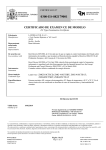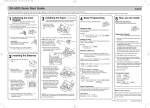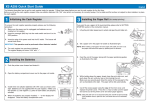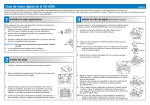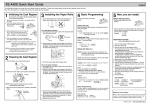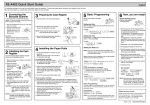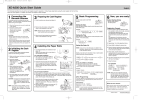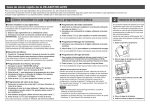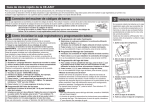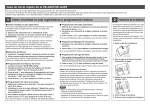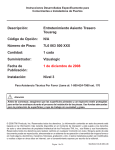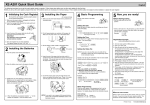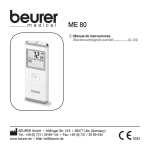Download Sharp XE-A20S Quick Guide
Transcript
XE-A20S Quick Start Guide English The following describes how to get the cash register ready to operate. Follow these steps before you use the cash register for the first time. Before you set up the cash register, prepare three new “AA” batteries which are necessary for memory backup. Find a stable and flat surface not subject to direct radiation, to place the cash register. the Cash 1 Initializing Register To ensure the cash register operates properly, please use the following procedure: 1. Make sure the power cord is unplugged and batteries are not installed on the register. 2. Insert the manager (MA) key into the mode switch and turn it to the REG position. REG OPX/Z OFF If you want to use a paper roll for journal printing, please refer to GETTING STARTED section of the instruction manual. 1. Lift up the print roller release lever to unlock and open the print roller arm. 4 Basic Programming Set the mode switch to the PGM position. Print roller arm 5 Now, you are ready! REG OPX/Z OFF MGR X1/Z1 Before Starting Entries • Set the mode switch to the REG position. X2/Z2 VOID PGM REG OPX/Z OFF Setting the Date VOID PGM Enter the date in 8 digits using the month-day-year format. Then press s. X1/Z1 MGR X1/Z1 X2/Z2 MA X2/Z2 Example: Print roller release lever 3. Insert the plug of the power cord into the AC outlet. The buzzer will sound three times. IMPORTANT: This operation must be performed without batteries installed. 2 (for receipt printing) MGR VOID PGM 4. The cash register has now been initialized. The register display will show “0.00” with “ 3 Installing the Paper 2. Set a paper roll in the paper roll cradle as illustrated below. Correct Installing the Batteries To the printer Incorrect 3. Feed the end of the paper along with the paper positioning guides as illustrated at the right. Paper positioning guides Enter the time in 4 digits (“hhmm” format) using the 24 hour system. Then press s. Example: 1430 s Time (2:30 p.m.) Setting Tax Rates (%) NOTE: If you are in an area that uses a tax table for tax calculation, please refer to the programming section in the instruction manual. Specify a tax rate (%) for calculation of tax on each taxable subtotal using the following sequence: 1. Push the printer cover forward and detach it. s 9 @ @➔Q➔s➔A ➔ 2. Open the battery compartment cover next to the paper roll cradle. 3. Install three new “AA” batteries as shown at the right. (Batteries are not supplied with the cash register.) Make sure that positive (+) and negative (–) poles of each battery are properly oriented. 4. When the batteries are properly installed, “ ” on the display will disappear. Close the battery compartment cover. 4. While holding down the paper, slowly close the print roller arm, and push down the arm until you hear a click locking the arm. Make sure securely you push down the center of the wing part of the arm as illustrated at the right. The paper will be fed automatically. 5. Cut off the excess paper using the edge of the inner cover, and replace the printer cover. Press the F key to make sure the paper end comes out of the printer cover and clean paper appears. NOTE: If the print roller arm is not securely locked, printing is not done right. If this problem occurs, open the arm, and close the arm as instructed above. ➔ Registration Example (when selling department items by cash) 1. Enter your clerk code. (By default, clerk code 1 is assigned.) Setting the Time To the printer ”. 08262005 s Date (August 26, 2005) ➔ Tax number (1 to 4)* ➔ @ ➔R ➔ where R: Tax rate (0.0000% to 100.0000%) Q: Minimum taxable amount (0.01 to 999.99) (Smallest amount for which tax must be collected.) *Up to 4 types of tax are programmable. Example: s 9@ 1@ 6P25@ 12 s A Tax 1 Tax rate (6.25%) Min. taxable amount ($0.12) 2. Enter the price for the first department item. For example for 5.00, enter 5:, and press the appropriate department key. For department 17 to department 32, press D first before pressing the department key. For department 33 and above, enter the department code using numeric keys, and press d, then enter the price and press d again. 3. Repeat step 2 for all the department items. 4. Press s to display the amount due. 5. Enter the amount received from the customer. (You can omit this step if the amount tendered is the same as the subtotal.) 6. Press A, and the change due is displayed (when the amount received was not entered, total amount is displayed) and the drawer is opened. 7. Tear off the receipt and give it to the customer with his or her change. 8. Close the drawer. Key operation example 1L 5:! Clerk code Price and dept.1 825D" Price and dept. 18 s 2:0 A Amount tendered Other Programming While the cash register is pre-programmed so it can be used with minimal set-up, it does provide you optional features. For details, please refer to the instruction manual. Initial settings: Department 1 to 10: Taxable 1 Department 11 to 99: Non-taxable. When an error occurs: When an error occurs with an alarm sound, press l to clear the error. If you do not clear the error, press E twice. The transaction will be finalized in subtotal void or cash sale. Printed in China / Impreso en China KS(TCADH2482RCZZ) 1 Guía de inicio rápido de la XE-A20S Espanõl A continuación se describe la forma de dejar preparada la caja registradora para el funcionamiento. Siga estos pasos antes de emplear la caja registradora por primera vez. Antes de configurar la caja registradora, prepare tres pilas nuevas del tamaño “AA” que serán necesarias para respaldar la memoria. Prepare una superficie plana y estable que no esté sujeta a los rayos directos del sol, para colocar la caja registradora. 1 Inicialice la caja registradora 3 Instale el rollo de papel Para asegurarse de que la caja registradora funciona correctamente, emplee el siguiente procedimiento: 1. Asegúrese de que el cable de la alimentación esté desenchufado y que no se hayan instalado las pilas en la caja registradora. 2. Inserte la llave de administrador (MA) en el selector de modo y gírelo a la posición REG. REG OPX/Z OFF MA VOID PGM MGR X1/Z1 ya estará 5 Ahora preparado 4 Programación básica Ponga el selector de modo en la posición PGM. REG OPX/Z OFF VOID MGR X1/Z1 Antes de comenzar con los registros • Ponga el selector de modo en la posición REG. X2/Z2 REG PGM OPX/Z OFF Ajuste de la fecha MGR VOID PGM Introduzca la fecha con 8 dígitos, usando el formato de mes-día-año. Luego, pulse s. X1/Z1 X2/Z2 X2/Z2 3. Enchufe la clavija del cable de alimentación a la toma de corriente de CA. El zumbador sonará tres veces. IMPORTANTE: Esta operación debe efectuarse antes de haber instalado las pilas. 4. La caja registradora habrá quedado ahora inicializada. El visualizador de la caja registradora mostrará “0.00” con “ ”. 2 (para imprimir recibos) Si desea emplear un rollo de papel para la impresión de registrso diarios, consulte la sección de PARA EMPEZAR del manual de instrucciones. 1. Levante la palanca Brazo del de liberación del rodillo impresor rodillo impresor para desbloquear y abrir el brazo del rodillo impresor. Instale las pilas Palanca de liberación del rodillo impresor 2. Ponga un rollo de papel en el soporte del rollo de papel como se muestra a continuación. A la impresora Correcto A la impresora Incorrecto 3. Haga avanzar el extremo del papel junto con las guías de papel como se muestra a la derecha. Guías de papel 1. Empuje la cubierta de la impresora hacia delante y sepárela. 2. Abra la cubierta del compartimiento de las pilas que se encuentra al lado del soporte del rollo de papel. 3. Instale tres pilas nuevas del tamaño “AA” como se muestra a la derecha. (Las pilas no se suministran con la caja registradora.) Asegúrese de que las polaridades positiva (+) y negativa (-) de cada pila queden correctamente orientadas. 4. Cuando las pilas están correctamente instaladas, desaparecerá “ ” del visualizador. Cierre la cubierta del compartimiento de las pilas. Ejemplo: 08262005 s 5. Corte el papel sobrante empleando el borde de la cubierta interior, y vuelva a colocar la cubierta de la impresora. Pulse la tecla F para asegurarse que el papel sale por la cubierta de la impresora y que aparece papel limpio. NOTA: Si el brazo del rodillo impresor no está bloqueado correctamente, no se podrá imprimir con éxito. Si ocurre este problema, abra el brazo, y ciérrelo de nuevo como se ha indicado arriba. (cuando se venden artículos de sección pagados en metálico) Fecha (26 de agosto, 2005) Ajuste de la hora Introduzca la hora con 4 dígitos (formato “hhmm”), usando el sistema de 24 horas. Luego, pulse s. Ejemplo: 1430 s Hora (2:30 p.m.) Ajuste de las tasas de impuestos (%) NOTA: Si usted reside en una zona que emplea una tabla de impuestos para calcular los impuestos, consulte la sección de programación del manual de instrucciones. Especifique una tasa de impuestos (%) para el cálculo de los impuestos de cada subtotal imponible empleando la secuencia siguiente: 4. Mientras mantiene retenido el papel, cierre lentamente el brazo del rodillo impresor, y empuje el brazo hacia abajo hasta oír un sonido seco de confirmación. Asegúrese que empuja con seguridad el centro de la parte del ala del brazo como se muestra a la derecha. El papel avanzará automáticamente. Ejemplo de registro s➔9➔@➔ Número de impuestos (1 al 4)* ➔ @➔R➔@➔Q➔s➔A donde, R: Tasa de impuestos (0,0000% a 100,0000%) Q: Importe imponible mínimo (0,01 a 999,99) (El importe más pequeño para el que deben cargarse los impuestos.) *Pueden programarse hasta 4 tipos de impuestos. Ejemplo: s 9@ 1@ 6P25@ 12 s A Impuestos 1 Tasa de impuestos Importe imponible (6,25%) 1. Introduzca su código de dependiente. (Como ajuste inicial, se asigna el código de dependiente 1.) 2. Introduzca el precio del primer artículo de la sección. Por ejemplo, para 5,00 introduzca 5: y pulse la tecla de la sección apropiada. Para las secciones 17 a 32, pulse primero D antes de pulsar la tecla de sección. Para la sección 33 y las posteriores, introduzca el código de sección con las teclas numéricas y pulse d, y luego introduzca el precio y pulse de nuevo d. 3. Repita el paso 2 para todos los artículos de la sección. 4. Pulse s para visualizar el importe correspondiente. 5. Introduzca el importe recibido del cliente. (Puede omitirse este paso, si el importe recibido es el mismo que el subtotal.) 6. Pulse A, y se visualizará la vuelta correspondiente (cuando el importe recibido no se haya introducido, se visualizará el importe total) y se abrirá el cajón. 7. Corte el recibo y déselo al cliente con la vuelta. 8. Cierre el cajón. Ejemplo de operación de teclas 1L 5:! 825D" Código de Precio y sección 1 dependiente Precio y sección 18 s 2:0 A Importe recibido mínimo ($0,12) Otras programaciones Aunque la caja registradora viene ya programada para poderla utilizar con la mínima configuración, la máquina le ofrece funciones opcionales. Para los detalles al respecto, consulte el manual de instrucciones. Ajustes iniciales: Sección 1 a 10: Imponible 1 Sección 11 a 99: No imponible Cuando ocurre un error: Cuando ocurre un error con un sonido de alarma, pulse l para borrar el error. Si no borra el error, pulse E dos veces. La transacción se finalizará en cancelación de subtotal o venta en metálico. Impreso en China KS(TCADH2482RCZZ) 1
This document in other languages
- español: Sharp XE-A20S


